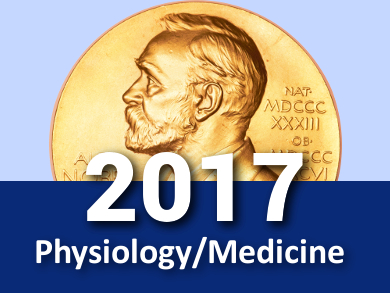The Nobel Prize in Physiology or Medicine for 2017 has been jointly awarded to Jeffrey C. Hall, University of Maine, Maine, Michael Rosbash, Brandeis University, Waltham, MA, and Michael W. Young, Rockefeller University, New York, NY, all USA, “for their discoveries of molecular mechanisms controlling the circadian rhythm”.
Their discoveries explain how organisms adapt their internal, biological clock so that it is synchronized with the regular rhythm of the day. The clock regulates functions such as behavior, hormone levels, sleep, body temperature, and metabolism. The Laureates used fruit flies as a model organism to isolate a gene that controls the normal daily biological rhythm and showed that this gene encodes a protein that accumulates in the cell during the night, and is then degraded during the day.
Jeffrey C. Hall, born 1945 in New York, USA, received his Ph.D. in 1971 from the University of Washington, Seattle, USA, and was a postdoctoral fellow at the California Institute of Technology (Caltech), Pasadena, USA, from 1971 to 1973. He joined the faculty at Brandeis University in Waltham in 1974. Since 2002, he is at the University of Maine, Orono, USA.
Michael Rosbash, born in 1944 in Kansas City, USA, received his Ph.D. in 1970 from the Massachusetts Institute of Technology (MIT), Cambridge, USA. From 1970 to 1973, he was a postdoctoral fellow at the University of Edinburgh, Scotland. Since 1974, he has been at Brandeis University, Waltham, USA.
Michael W. Young, born in 1949 in Miami, USA, received his Ph.D. from the University of Texas, Austin, USA, in 1975. Between 1975 and 1977, he was a postdoctoral fellow at Stanford University, Palo Alto, USA. Since 1978, he has been at the Rockefeller University, New York, USA.
Among many other honors, Michael W. Young, Michael Rosbash, and Jeffrey C. Hall were awarded the Wiley Prize in Biomedical Sciences in 2013.
Selected Papers
W. A. Zehring, D. A. Wheeler, P. Reddy, R. J. Konopka, C. P. Kyriacou, M. Rosbash, J. C. Hall, P-element transformation with period locus DNA restores rhythmicity to mutant, arrhythmic Drosophila melanogaster, Cell 1984, 39, 369–376. https://doi.org/10.1038/312752a0
T. A. Bargiello, F. R. Jackson, M. W. Young, Restoration of circadian behavioural rhythms by gene transfer in Drosophila, Nature 1984, 312, 752–754. https://doi.org/10.1038/312752a0
K. K. Siwicki, C. Eastman, G. Petersen, M. Rosbash, J. C. Hall, Antibodies to the period gene product of Drosophila reveal diverse tissue distribution and rhythmic changes in the visual system, Neuron 1988, 1, 141–150. http://dx.doi.org/10.1016/0896-6273(88)90198-5
P. E. Hardin, J. C. Hall, M. Rosbash, Feedback of the Drosophila period gene product on circadian cycling of its messenger RNA levels, Nature 1990, 343, 536–540. https://doi.org/10.1038/343536a0
X. Liu, L. J. Zwiebel, D. Hinton, S. Benzer, J. C. Hall, M. Rosbash, The period gene encodes a predominantly nuclear protein in adult Drosophila, J. Neurosci. 1992, 12, 2735–2744.
L. B. Vosshall, J. L. Price, A. Sehgal, L. Saez, M. W. Young, Block in nuclear localization of period protein by a second clock mutation, timeless, Science 1994, 263, 1606–1609. https://doi.org/10.1016/S0896-6273(00)80222-6
J. L. Price, J. Blau, A. Rothenfluh, M. Abodeely, B. Kloss, M. W. Young, double-time is a novel Drosophila clock gene that regulates PERIOD protein accumulation, Cell 1998, 94, 83–95. https://doi.org/10.1016/S0092-8674(00)81224-6
Also of Interest
- Who’s Next? Nobel Prize in Chemistry 2017,
Make your predictions for the 2017 Nobel Prize in Chemistry
- The Nobel Prize,
Veronika Belusa,
ChemViews Mag. 2015.
Collection of information on the Nobel Prize




